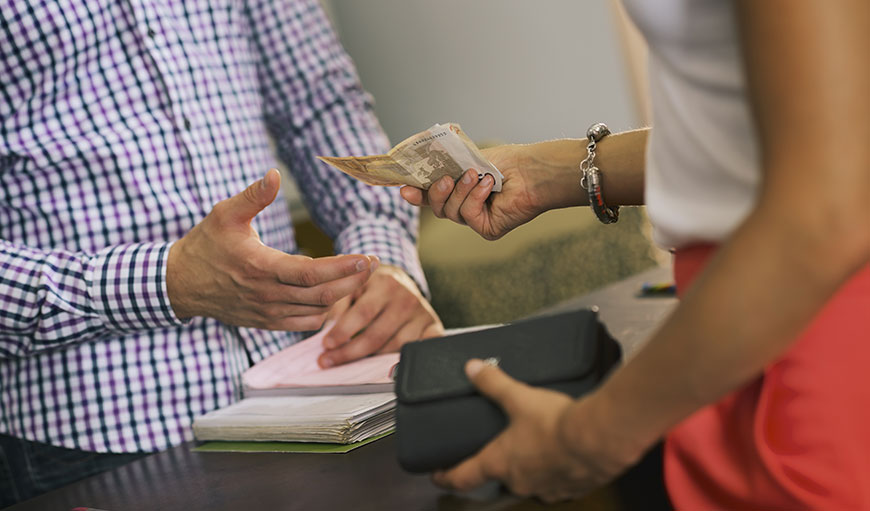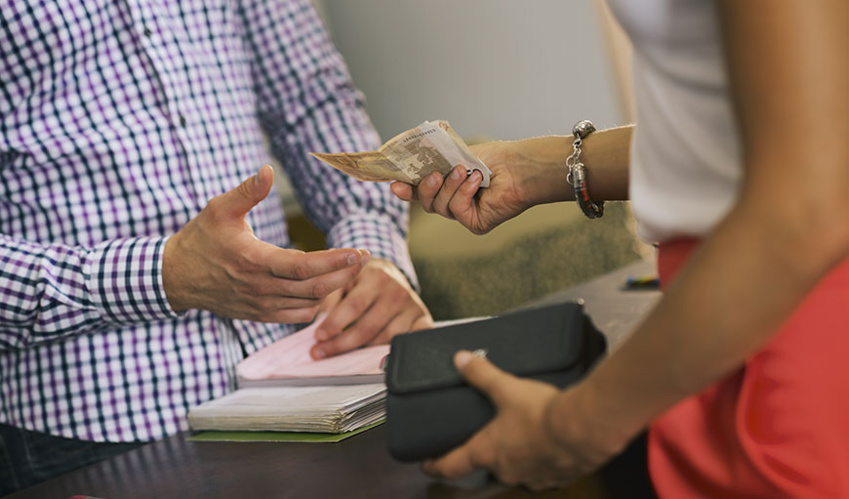Societies define themselves with their origins, and in the care they have for their most vulnerable members. This applies to humanity, politics, regulations, and it applies to economics too. The underprivileged have their own share of plights, and their own way to deal with their financial lives. One of the most prominent characteristics is the payment instrument which they use. Whereas the world is slowly moving along towards online and mobile payments, two categories stand out with a stubborn attachment to cash: the poor and the elderly. Many of the world’s poor simply don’t have a bank, and live exclusively with cash. The reasons behind this are many: some don’t trust banks, whereas some fail to open an account at the local bank, which is always keener to open accounts for rich people than for the poor. In any case the world of cash is slowly being nibbled at, and along with that phenomenon comes the risk of increased isolation. Following a recent initiative launched in England, the Prime Minister announced : “Three quarters of GPs surveyed have said they are seeing between one and five people a day suffering with loneliness, which is linked to a range of damaging health impacts, like heart disease, strokes and Alzheimer’s disease.” Paradoxically, the digital age promised to connect citizens to one another, and in many ways increased the isolation of the most vulnerable tranches of our societies. NYT reporter Anna Kowal Smith adds : “A person is a person through other persons.” And increasingly, scientific research suggests that meaningful interaction with “other persons” makes us whole, thriving and engaged human beings, with a stronger sense of belonging and inclusion.”, hinting at how few and far apart the opportunities to make physical contact on a daily basis have become. The little regular payments of economic lives (as simple as buying a newspaper) are a thread in the social fabric - in the case of cash, more than with other forms of money. The trend is global: the poorer, the more isolated, no matter the country. Another vulnerable segment of the global population are the elderly, and they also hang on to cash. Born in generations when no computers existed, they learned financial operations with cash, and feel uneasy and out of depth with the modern payment instruments which the world offers today, and which their grandchildren aster with ease. But, unbeknownst to many of them, they may be hit with a very unpleasant surprise, in coming years.
They are at risk of being further isolated and excluded, with the progress of the cashless trend. Banks are keen, and pushing hard, at the idea that cash would be simply discontinued. Always eager to increase profits and decrease costs, they have found that electronic money simply was better adapted to their needs nowadays. And, as crazy as the idea may have sounded a few years ago, governments are starting to grant them the dream-come-true. In recent years, banks have immensely reduced the amount of currency which they keep at their premises, with some banks outright discontinuing cash services. FintechNews writes that “Banks and fintech companies are developing innovative solutions for consumers to pay for goods and withdraw cash without payment cards, offering entirely new ways to transact. In the US, JPMorgan Chase, Bank of America and Wells Fargo are among those that are grabbing on to the emerging mobile payment trend.” Meanwhile, other banks have made their entire policy cashless, such as Australian bank Citibank. According to the official policy, customers are the ones who are driving this cashless trend, not banks - although public outcries suggest the opposite. The workforce which has been recruited this objective is impressive: banks, government agents, central banks, economists, and PR specialists and the angles under which cash is being attacked are countless. But then what would become of the (many) people around us who live exclusively off cash?
Associations are gathering around these vulnerable segments of the population, to raise public awareness about the danger. Policy-makers are usually middle- or upper-class and may simply be unaware of the damage they would cause, by furthering this cause, including to themselves. A nation’s coherence is one of the things better-off citizens take care of for their less fortunate fellows. And banknotes, beyond their financial use, have precisely this purpose: embodying a nation’s coherence. Banknotes carry meaning, embody relationships, and even carry feeling. Many a shop in America has framed its first dollar, as a reminder of the life-changing commitment the shopkeeper made upon opening the store, years before. A banknote is a symbol, and not only of the faces or monuments printed on it: it illustrates what a nation has achieved and produced, what a country is eager to show to the world. The private nature of cash symbolizes the trust between the two agents of the transaction, and their ability to conduct their business without state supervision. Who does not remember the banknote hidden in the birthday card received from their grandmothers, during their childhood? And when a passer-by reaches down to drop a few coins into the beggar’s hat, the action is much more than a simple financial transaction. Turning all of our money into electronic digits may mean more efficient governments, and maybe not. But it will dramatically reduce the poetry and feeling of our lives - something the world needs more of, not less.
Each of the coins and banknotes, rattling and shuffling at the bottom of our overcoat pockets, have been passed through countless hands, fed numerous families, paid off many debts, before returning to our possession. And while one of them may be lost between many others, in a wad or money-clip, that single banknote may, a few days before, been the difference between a hot meal or hunger, or between the streets and a cheap hotel room, for a less fortunate fellow citizen. It may well also have been a loving birthday gift for a grandchild.
They are at risk of being further isolated and excluded, with the progress of the cashless trend. Banks are keen, and pushing hard, at the idea that cash would be simply discontinued. Always eager to increase profits and decrease costs, they have found that electronic money simply was better adapted to their needs nowadays. And, as crazy as the idea may have sounded a few years ago, governments are starting to grant them the dream-come-true. In recent years, banks have immensely reduced the amount of currency which they keep at their premises, with some banks outright discontinuing cash services. FintechNews writes that “Banks and fintech companies are developing innovative solutions for consumers to pay for goods and withdraw cash without payment cards, offering entirely new ways to transact. In the US, JPMorgan Chase, Bank of America and Wells Fargo are among those that are grabbing on to the emerging mobile payment trend.” Meanwhile, other banks have made their entire policy cashless, such as Australian bank Citibank. According to the official policy, customers are the ones who are driving this cashless trend, not banks - although public outcries suggest the opposite. The workforce which has been recruited this objective is impressive: banks, government agents, central banks, economists, and PR specialists and the angles under which cash is being attacked are countless. But then what would become of the (many) people around us who live exclusively off cash?
Associations are gathering around these vulnerable segments of the population, to raise public awareness about the danger. Policy-makers are usually middle- or upper-class and may simply be unaware of the damage they would cause, by furthering this cause, including to themselves. A nation’s coherence is one of the things better-off citizens take care of for their less fortunate fellows. And banknotes, beyond their financial use, have precisely this purpose: embodying a nation’s coherence. Banknotes carry meaning, embody relationships, and even carry feeling. Many a shop in America has framed its first dollar, as a reminder of the life-changing commitment the shopkeeper made upon opening the store, years before. A banknote is a symbol, and not only of the faces or monuments printed on it: it illustrates what a nation has achieved and produced, what a country is eager to show to the world. The private nature of cash symbolizes the trust between the two agents of the transaction, and their ability to conduct their business without state supervision. Who does not remember the banknote hidden in the birthday card received from their grandmothers, during their childhood? And when a passer-by reaches down to drop a few coins into the beggar’s hat, the action is much more than a simple financial transaction. Turning all of our money into electronic digits may mean more efficient governments, and maybe not. But it will dramatically reduce the poetry and feeling of our lives - something the world needs more of, not less.
Each of the coins and banknotes, rattling and shuffling at the bottom of our overcoat pockets, have been passed through countless hands, fed numerous families, paid off many debts, before returning to our possession. And while one of them may be lost between many others, in a wad or money-clip, that single banknote may, a few days before, been the difference between a hot meal or hunger, or between the streets and a cheap hotel room, for a less fortunate fellow citizen. It may well also have been a loving birthday gift for a grandchild.


 Society: the social utility of cash
Society: the social utility of cash





 Companies
Companies